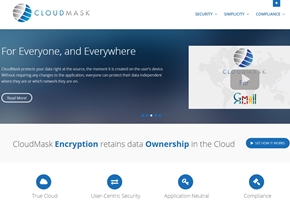Data protection company
CloudMask has launched in the UK against a backdrop of reforms spurred by concerns about data in the cloud. The company specializes in sensitive data protection in a cloud environment, offering a 'zero trust' model which provides a fundamental shift in how business data is protected, excluding key personal such as cloud administrators, employees, and even IT administrators from data access.
CloudMask, whose partners include Entrust, Salesforce, IBM and Amazon, has previously won the Canadian Innovation Commercialization Program (CICP). Its solution helps users achieve data residency and privacy regulations (including EU Data Protection Directives and UK DPA) and can protect data even if a cloud environment has been completely compromised. CloudMask tracks and controls data access and retrieval throughout the entire data "lifecycle" (including storage and processing). Data is masked as soon as it is created, and at no point does the system provide usable data until required to do so by a qualified user. The solution totally eliminates encryption gateway requirements and the need for Virtual Private Networks (VPNs) and related costs.
CloudMask has been adopted by a range of North American organizations, particularly the public, legal, financial and healthcare sectors. It has also being utilized by the Canadian federal government's Shared Service Canada (SSC) initiative which covers a number of Canadian Federal Government departments.
"New legislation and a hike in data leaks needn't deter anyone from adopting cloud technologies," explained CloudMask's CEO, Wael Aggan. "A switch to cloud computing marks a decrease in the emphasis on systems and an increase in the focus on data. By masking data from creation, in transit, storage and processing to the final point of consumption, businesses can easily address security concerns about data privacy including residency and compliance."
Compliance and data protection in the cloud... What are the issues? Let us know your thoughts. Add your comments below.
